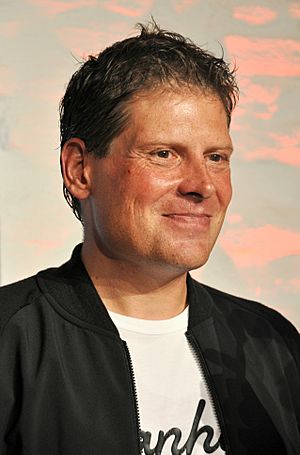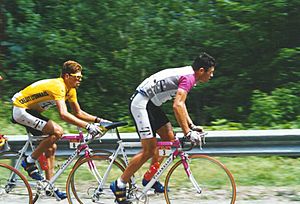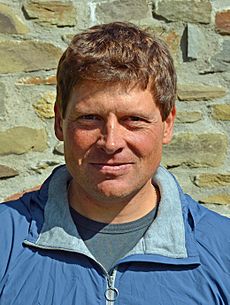Jan Ullrich facts for kids

Ullrich in 2016
|
|||
| Personal information | |||
|---|---|---|---|
| Full name | Jan Ullrich | ||
| Nickname | Der Kaiser (The Emperor) Der Jan Der Junge (The Young one) The Yoyo |
||
| Born | 2 December 1973 Rostock, East Germany |
||
| Height | 1.83 m (6 ft 0 in) | ||
| Weight | 73 kg (161 lb; 11 st 7 lb) | ||
| Team information | |||
| Discipline | Road | ||
| Role | Rider | ||
| Rider type | All-rounder | ||
| Major wins | |||
|
|||
Jan Ullrich (born December 2, 1973) is a famous German former professional road bicycle racer. He won gold and silver medals at the 2000 Summer Olympics in Sydney. Ullrich also won the 1999 Vuelta a España and the HEW Cyclassics race in his home country in 1997. His big win at the 1997 Tour de France made cycling very popular in Germany. He stopped racing professionally in February 2007.
In 2006, Ullrich was not allowed to race in the Tour de France because of questions about his participation in a sports investigation. In 2012, a sports court found him responsible for a rule violation. As a result, all his race results from May 2005 onwards were removed. In 2013 and 2023, he admitted to using certain substances to improve his performance during his career.
Contents
- Jan Ullrich's Cycling Journey
- Jan Ullrich Bicycles
- Personal Life and Family
- Major Achievements
- Images for kids
- See also
Jan Ullrich's Cycling Journey
Early Life and Amateur Racing
Jan Ullrich started cycling at a young age. He joined a club called SG Dynamo Rostock in his hometown. He won his first bike race when he was only nine years old. He even rode in regular sports shoes and on a rented bike!
In 1986, he went to a special sports school in Berlin. He became a champion in East Germany in 1988. After the Berlin Wall fell, the school closed. Jan and his coaches joined an amateur club in Hamburg, where he raced until 1994. In 1993, when he was 19, Ullrich won the amateur road race title at the 1993 UCI Road World Championships in Oslo. The next year, he finished third in the world time trial championship.
Starting as a Professional Cyclist
In 1995, Ullrich became a professional rider for the Telekom team. He was quiet during his first year and a half. In 1995, he became the national time trial champion. He also placed well in stages of the 1995 Tour de Suisse. He wanted to race in the 1995 Tour de France, but his team thought he was too young. Instead, he raced in a smaller German race and finished third. He later started the 1995 Vuelta a España but left the race early.
1996 Tour de France Debut
Ullrich chose to ride his first Tour de France in 1996 instead of joining the German Olympic team. He started well and stayed near the top. In the mountain stages, he showed his strength. He finished 30 seconds behind his teammate Bjarne Riis on one tough stage.
As the race continued, Ullrich moved into second place overall, right behind Riis. He won the final individual time trial stage, which was his first Tour stage win. He cut down Riis's lead by over two minutes. Other famous cyclists, like Miguel Induráin, said that Ullrich would win the Tour someday. Jan finished his first Tour in second place, just 1 minute and 41 seconds behind his teammate Riis.
1997 Tour de France Victory

Before the 1997 Tour, Ullrich had already won two races. He won a stage in the Tour de Suisse and the German national Road Race championship. He became a favorite to win the 1997 Tour de France. He started strong, finishing second in the first short time trial.
On stage 9, the first mountain stage, Ullrich worked to help his teammate Riis. But when another rider, Richard Virenque, attacked, Ullrich reacted quickly. On stage 10, Ullrich asked his team if he could attack. He then rode away from other top riders like Marco Pantani and Virenque. He finished a minute ahead, earning his first yellow jersey as the leader of the race. A French newspaper called him "the boss." Ullrich also won the Stage 12 time trial by a large margin.
Even when Pantani attacked in the mountains, Ullrich managed to limit his time losses. In the final time trial, Ullrich increased his lead. The next day, he became the first German to win the Tour de France. At 23, he was one of the youngest winners since 1947. Soon after, he won the Hews Cycling Classic in Hamburg. He was named "sports person of the year" in Germany in 1997.
1998 Tour de France Challenge
Ullrich was the defending champion in the 1998 Tour. He took the lead on stage 7, a time trial. However, on stage 15, Marco Pantani made a huge attack in the mountains. Ullrich was left behind and finished almost nine minutes after Pantani. This dropped Ullrich to fourth place overall.
Ullrich fought back on stage 16, attacking on a tough climb. Only Pantani could keep up. Ullrich won the sprint at the end of the stage and moved into third place. He also won the final stage, a short time trial, and finished the Tour in second place overall.
1999 Vuelta a España Victory
In 1999, Ullrich had a knee injury and could not ride the Tour de France. He decided to focus on the Vuelta a España and the world time trial championship.
In the Vuelta, Ullrich won the first mountain stage in a group sprint. He took the lead on stage 12. He continued to perform strongly, winning the final time trial by almost three minutes. Ullrich won his second major Grand Tour. A few weeks later, he became the world time trial champion.
Olympic Success and Later Tours
2000 to 2002 Races
The 2000 Tour de France was the first time Ullrich, Marco Pantani, and Lance Armstrong all competed against each other. Armstrong proved to be very strong and won that year and again in 2001. Ullrich crashed during a downhill section in 2001, and Armstrong waited for him to get back on his bike, showing good sportsmanship.
Ullrich had a fantastic performance at the 2000 Summer Olympics in Sydney. He worked with his Telekom teammates Andreas Klöden and Alexander Vinokourov to form a leading group. Ullrich won the gold medal in the road race, with Vinokourov taking silver and Klöden bronze, making it an all-Telekom podium! He also won a silver medal in the time trial, finishing just seven seconds behind the winner.
In 2002, Ullrich faced a difficult period. He was diagnosed with a knee injury and was not racing for several months. His contract with Team Telekom ended, and he was suspended for six months due to a rule violation. The German Cycling Federation decided he was not trying to gain an unfair advantage, so he received a minimum suspension.
2003 Tour and Fair Play
In 2003, Ullrich joined a new team, Team Coast, which later became Team Bianchi. The 2003 Tour de France was different for Ullrich; he wasn't seen as the main favorite. He got sick early in the race but fought hard. He gained time on Armstrong in a time trial, closing the gap in the overall standings.
On a mountain stage to Luz Ardiden, Armstrong fell after his handlebar got caught on a spectator's bag. Ullrich, showing great sportsmanship, waited for Armstrong to recover before continuing the race. Armstrong then caught up and attacked. Ullrich finished second overall in the Tour, just 71 seconds behind Armstrong.
For waiting for Armstrong, the German Olympic Association gave Ullrich a fair-play medal. This act was seen as a memorable moment of sportsmanship.
2004 and 2005 Tours
In 2004, Ullrich returned to his former team, now called T-Mobile. He won the Tour de Suisse by just one second. In the Tour de France, he finished fourth, which was his first time finishing lower than second place.
In 2005, Ullrich was again the captain for T-Mobile. He had a quiet start to the season but finished third in the 2005 Tour de Suisse. The day before the 2005 Tour de France, Ullrich had a training accident. He still competed but faced challenges, including another fall in the mountains. He focused on securing a podium spot and finished third overall in the Tour.
Later Career and Retirement
After Armstrong retired in 2005, Ullrich planned to race for one or two more years. He seemed to be in better shape than in previous years. In May 2006, he rode the Giro d'Italia to prepare for the Tour de France. He won a 50 km time trial stage by a significant margin. Ullrich later left the Giro due to back pain.
He then won the Tour de Suisse for a second time, winning the final time trial and moving from third to first place overall.
However, in June 2006, Ullrich was prevented from participating in the Tour de France due to an ongoing investigation into rule violations. On July 20, 2006, T-Mobile ended his contract. Ullrich expressed his disappointment about how the news was shared with him.
Investigations continued, and in February 2012, a sports court found Ullrich responsible for a rule violation. As a result, all his race results from May 2005 onwards were removed from his official record. Ullrich stated he would not appeal the decision and expressed regret for his actions. In 2013 and 2023, he admitted to using performance-enhancing substances during his career.
On February 26, 2007, Ullrich announced his retirement from professional cycling. He stated that he had never cheated as a cyclist. He later became an advisor for a cycling team.
The IOC looked into whether Ullrich should lose his medals from the 2000 Olympic Games. However, they decided there wasn't enough clear evidence against him, so he was allowed to keep his medals. Ullrich has stated that he believes he should keep his medals because he felt he was competing on an equal playing field with other riders at the time.
Jan Ullrich Bicycles
In May 2006, Jan Ullrich launched his own line of bicycles called the Jan Ullrich Collection. He helped design these bikes, which are built in partnership with a German company called Ghost Bikes.
Personal Life and Family
Jan Ullrich lived in Merdingen, Germany, for several years with his partner, Gaby Weiss. They had a daughter together. In 2002, they moved to Scherzingen, Switzerland. After they separated in 2005, Ullrich continued to live in Scherzingen.
In September 2006, Ullrich married Sara Steinhauser, who is the sister of his former teammate. They have three children together.
In 2018, Ullrich shared that he has been diagnosed with ADHD. He also spoke about overcoming personal challenges and how he is now doing much better.
Major Achievements
- 1993
- 1st
 Road race, UCI Amateur Road World Championships
Road race, UCI Amateur Road World Championships - 1994
- 2nd Time trial, National Road Championships
- 3rd
 Time trial, UCI Road World Championships
Time trial, UCI Road World Championships - 1995
- 1st
 Time trial, National Road Championships
Time trial, National Road Championships - 2nd Overall Tour du Limousin
- 3rd Overall Hofbräu Cup
- 1996
- 1st
 Overall Regio-Tour
Overall Regio-Tour
- 1st Stage 3a (ITT)
- 2nd Overall Tour de France
- 1st Young rider classification
- 1st Stage 20 (ITT)
- 2nd Road race, National Road Championships
- 3rd Telekom Grand Prix (with Bjarne Riis)
- 4th Grand Prix Eddy Merckx
- 6th Classic Haribo
- 10th Tour du Haut Var
- 1997
- 1st
 Road race, National Road Championships
Road race, National Road Championships - 1st
 Overall Tour de France
Overall Tour de France
- 1st Young rider classification
- 1st Stages 10 & 12 (ITT)
- 1st HEW Cyclassics
- 1st Luk-Cup Bühl
- 2nd Züri-Metzgete
- 3rd Overall Tour de Suisse
- 1st Stage 3
- 3rd Overall Ronde van Nederland
- 5th Klasika Primavera
- 7th Classique des Alpes
- 9th Overall Vuelta a Aragón
- 9th Rund um den Henninger Turm
- 10th Tour de Berne
- 1998
- 1st Rund um Berlin
- 1st Rund um die Nürnberger Altstadt
- 1st Sparkassen Giro Bochum
- 2nd Overall Tour de France
- 1st Young rider classification
- 1st Stages 7 (ITT), 16 & 20 (ITT)
- 2nd Road race, National Road Championships
- 3rd Overall Vuelta a Castilla y León
- 4th Overall Route du Sud
- 5th Overall Ronde van Nederland
- 9th HEW Cyclassics
- 10th Overall Tour de Suisse
- 1999
- UCI Road World Championships
- 1st
 Overall Vuelta a España
Overall Vuelta a España
- 1st Stages 5 & 20 (ITT)
- 3rd Milano–Torino
- 7th Overall Ronde van Nederland
- 2000
- Olympic Games
- 1st Coppa Ugo Agostoni
- 2nd Overall Tour de France
- 2nd Züri-Metzgete
- 2nd Luk-Cup Bühl
- 4th Road race, National Road Championships
- 4th Tre Valli Varesine
- 5th Overall Tour de Suisse
- 1st Stage 1 (TTT)
- 5th EnBW Grand Prix (with Andreas Klöden)
- 2001
- 1st
 Time trial, UCI Road World Championships
Time trial, UCI Road World Championships - 1st
 Road race, National Road Championships
Road race, National Road Championships - 1st Giro dell'Emilia
- 1st Stage 3 Giro della Provincia di Lucca
- 1st Stage 1 Hessen-Rundfahrt
- 2nd Overall Tour de France
- 2nd Züri-Metzgete
- 2nd Coppa Ugo Agostoni
- 4th Luk-Cup Bühl
- 5th EnBW Grand Prix (with Andreas Klöden)
- 8th Grand Prix Eddy Merckx
- 2003
- 1st Rund um Köln
- 2nd Overall Tour de France
- 1st Stage 12 (ITT)
- 2nd Züri-Metzgete
- 3rd HEW Cyclassics
- 5th Sparkassen Giro Bochum
- 5th Overall Deutschland Tour
- 6th GP du canton d'Argovie
- 7th Overall Tour de Suisse
- 2004
- 1st
 Overall Tour de Suisse
Overall Tour de Suisse
- 1st Coppa Sabatini
- 3rd Giro del Lazio
- 4th Overall Tour de France
- 5th Giro dell'Emilia
- 5th Rund um die Hainleite
- 6th Time trial, Olympic Games
- 7th Overall Deutschland Tour
- 2005
- 10th Overall Circuit de la Sarthe
Grand Tour Race Results
| Grand Tour | 1995 | 1996 | 1997 | 1998 | 1999 | 2000 | 2001 | 2002 | 2003 | 2004 | 2005 | 2006 |
|---|---|---|---|---|---|---|---|---|---|---|---|---|
| — | — | — | — | — | — | 52 | — | — | — | — | DNF | |
| — | 2 | 1 | 2 | — | 2* | 2* | — | 2* | 4* | — | ||
| DNF | — | — | — | 1 | DNF | — | — | — | — | — | — |
| — | Did not compete |
|---|---|
| DNF | Did not finish |
| Result later removed |
Images for kids
-
Ullrich in Hanover, 2005
See also
 In Spanish: Jan Ullrich para niños
In Spanish: Jan Ullrich para niños
 | Jessica Watkins |
 | Robert Henry Lawrence Jr. |
 | Mae Jemison |
 | Sian Proctor |
 | Guion Bluford |




